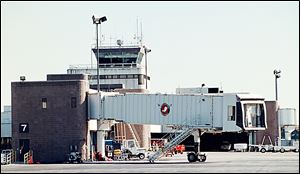
Possible FAA reductions at Toledo Express Airport spur business' plea for help
Air-traffic control overnight could be cut
3/28/2013
Overnight air-traffic service from the tower at Toledo Express Airport could be eliminated to save money under the federal government's budget sequestration.
Toledo Express Airport’s inclusion on a list of dozens of airports where the Federal Aviation Administration could eliminate overnight air-traffic control has prompted a prominent airport business to seek Toledo-Lucas County Port Authority help in lobbying against that possibility.
Grand Aire’s letter to airport committee Chairman Jerry Chabler follows by six days a letter distributed to airport businesses, and other potentially interested parties, from the National Air Traffic Controllers’ Association that warned of compromised aviation safety at Toledo Express if the airport’s tower is closed between midnight and 6 a.m.
Many charter flights that take sports teams, industrial shipments, and emergency medical deliveries in or out of Toledo “occur during the very hours that the FAA is considering abandoning the tower,” according to the letter signed by “the Cheema Family and the employees of Grand Aire.”
The absence of air-traffic control could send those charters elsewhere and endanger company personnel whose night work includes crossing the field with service vehicles, including fuel trucks, the letter said.
“We are asking the port authority to support us in objecting in the strongest terms to this proposed closure,” the letter concluded. “It is without a doubt in the interests of every company based at KTOL and every citizen of this area” that it be fully staffed around the clock “without interruption.”
“We’re working hard to build back the cargo business,” Jim Renda, Grand Aire’s business development manager, said Wednesday. “Anything that would cause them [carriers] to hesitate about coming into Toledo Express, we would not want that.”
The air-traffic controllers’ union letter said the potential elimination of overnight staffing is a consequence of federal budget sequestration but predicted that “once the facility closes on overnight shifts ... it will not reopen on those shifts if sequestration is ever replaced. It is our fear that the closure on the overnights and the absence of potentially life-saving ATC services during that time would become ‘the new normal’ or possibly predicate the complete closure of the facility,” wrote Micah Maziar, president of NATCA’s Toledo local.
Last week, the FAA announced the names of 149 airports for which it intends to eliminate tower operations provided by contractors, whereas Toledo and the others it continues to study are operated by federal employees.
The union says it expects the FAA to conclude its evaluation by mid-April. Tony Molinaro, an FAA spokesman in Chicago, said that except for identifying a list of 72 airports included in the study, he had no comment.
The list includes dozens of airports comparable to Toledo Express, including the commercial airports in Dayton, Akron-Canton, Youngstown, Lansing, and Fort Wayne, Ind., as well as some that are considerably bigger, such as Nashville, Milwaukee, Oklahoma City, and Chicago’s Midway Airport.
The Grand Aire letter suggested many charter flights would be in violation of their operating certificates if their pilots tried to land at an uncontrolled airport, but Paul Toth, the port authority’s president and a former director of Toledo Express, said such flights routinely operate in and out of airports without local air-traffic control.
“Just because you have don't have a tower doesn’t mean planes can’t land,” Mr. Toth said, before adding that he believes the presence of the Ohio Air National Guard’s 180th Fighter Wing, which has a 24-hour homeland-security mission, should protect Toledo Express from losing its overnight tower operation.
The controllers’ union said that during any hours the local tower were to be closed, flights headed to or from Toledo Express would be directed from the FAA’s Cleveland Air Route Traffic Control Center in Oberlin, which would not have radar capability below about 3,000 feet. Pilots would be required to communicate among each other to protect against conflicting take-offs, landings, or airfield taxiing.
Jerry Chabler, chairman of the port authority board’s airport committee, said he plans to read the Grand Aire letter into the record when the board of directors meets today. Cutting tower hours, he said, is “all about politics.”
“The leaders in Congress need to stop worrying about politics and they need to start thinking about the consequences of sequestration,” Mr. Chabler said. “God forbid something should happen at some airfield where somebody goes down because of this.”
Contact David Patch at: dpatch@theblade.com or 419-724-6094.